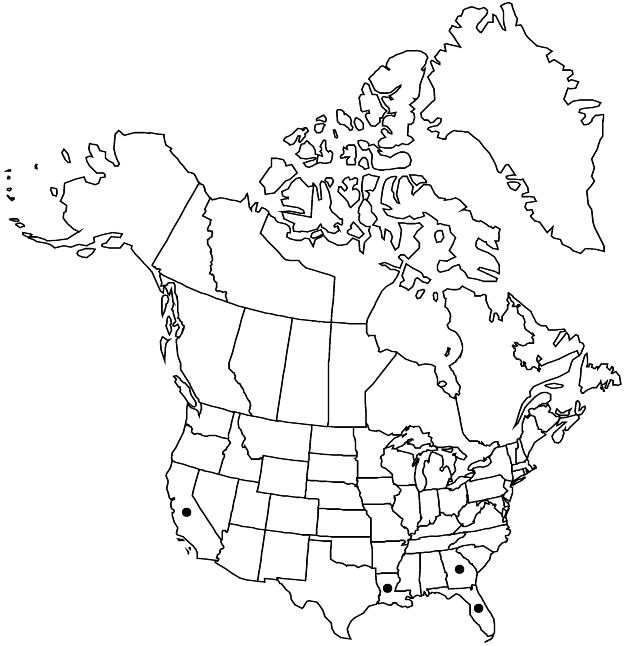Difference between revisions of "Pyracantha atalantioides"
Bot. Mag. 151: sub plate 9099. 1926.
FNA>Volume Importer |
imported>Volume Importer |
||
| (3 intermediate revisions by 2 users not shown) | |||
| Line 14: | Line 14: | ||
|name=Sportella atalantioides | |name=Sportella atalantioides | ||
|authority=Hance | |authority=Hance | ||
| + | |rank=species | ||
|publication_title=J. Bot. | |publication_title=J. Bot. | ||
|publication_place=15: 207. 1877 | |publication_place=15: 207. 1877 | ||
| Line 20: | Line 21: | ||
|name=Pyracantha discolor | |name=Pyracantha discolor | ||
|authority=Rehder | |authority=Rehder | ||
| + | |rank=species | ||
}} | }} | ||
|hierarchy=Rosaceae;Rosaceae subfam. Amygdaloideae;Rosaceae tribe Gillenieae;Pyracantha;Pyracantha atalantioides | |hierarchy=Rosaceae;Rosaceae subfam. Amygdaloideae;Rosaceae tribe Gillenieae;Pyracantha;Pyracantha atalantioides | ||
| Line 35: | Line 37: | ||
|elevation=0–300 m | |elevation=0–300 m | ||
|distribution=Calif.;Fla.;Ga.;La.;Asia (China). | |distribution=Calif.;Fla.;Ga.;La.;Asia (China). | ||
| + | |introduced=true | ||
|discussion=<p><i>Pyracantha atalantioides</i> is native to southeastern and western China. The species has been extensively planted in North America; it is apparently naturalized only sporadically in milder climatic areas of the continent.</p> | |discussion=<p><i>Pyracantha atalantioides</i> is native to southeastern and western China. The species has been extensively planted in North America; it is apparently naturalized only sporadically in milder climatic areas of the continent.</p> | ||
|tables= | |tables= | ||
| Line 44: | Line 47: | ||
-->{{#Taxon: | -->{{#Taxon: | ||
name=Pyracantha atalantioides | name=Pyracantha atalantioides | ||
| − | |||
|authority=(Hance) Stapf | |authority=(Hance) Stapf | ||
|rank=species | |rank=species | ||
| Line 60: | Line 62: | ||
|publication year=1926 | |publication year=1926 | ||
|special status=Introduced | |special status=Introduced | ||
| − | |source xml=https:// | + | |source xml=https://bitbucket.org/aafc-mbb/fna-data-curation/src/2e0870ddd59836b60bcf96646a41e87ea5a5943a/coarse_grained_fna_xml/V9/V9_796.xml |
|subfamily=Rosaceae subfam. Amygdaloideae | |subfamily=Rosaceae subfam. Amygdaloideae | ||
|tribe=Rosaceae tribe Gillenieae | |tribe=Rosaceae tribe Gillenieae | ||
Latest revision as of 22:59, 5 November 2020
Plants: crowns spreading or partially reclining, 10–60 dm. Stems: thorns abundant; young twigs yellowish brown-hairy, glabrescent. Leaves: stipules 3–7 mm; petiole 2–6 mm; blade elliptic, oblong, or oblong-obovate, 1.5–5 × 1–2 cm, base rounded to cuneate, margins entire or remotely serrulate distally (on vigorous shoots), apex obtuse, apiculate, or aristate, surfaces yellowish brown-hairy, glabrescent (abaxial becoming slightly glaucescent). Inflorescences 3–4 cm diam. Pedicels 5–10 mm, yellowish brown-hairy. Flowers 8–10 mm diam.; hypanthium hairy; calyx brown- or yellowish brown-puberulent when young, glabrescent, sepals broadly elliptic or triangular, 1–1.5 mm, apex obtuse; petals ovate, 4–5 mm, apex slightly apiculate. Pomes bright red, 4–7 mm diam.; pedicels 5–12 mm.
Phenology: Flowering Feb–May; fruiting Oct–Jan.
Habitat: Roadsides, thickets, disturbed ground, edges
Elevation: 0–300 m
Distribution

Introduced; Calif., Fla., Ga., La., Asia (China).
Discussion
Pyracantha atalantioides is native to southeastern and western China. The species has been extensively planted in North America; it is apparently naturalized only sporadically in milder climatic areas of the continent.
Selected References
None.